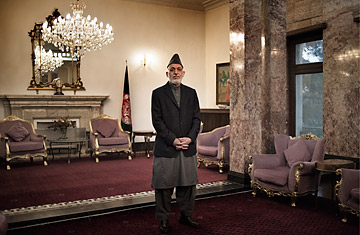
Pressure on Afghan President Hamid Karzai will increase as NATO begin to leave his country.
Afghan President Hamid Karzai has one of the toughest jobs in the world — and he's held it for a decade. With NATO forces set to depart Afghanistan over the next couple of years, the pressure on Karzai is only going to increase. The question for his country — and for his legacy — is whether Karzai can finally step up. In an hour-long interview with TIME's Aryn Baker at the presidential palace in Kabul, Karzai talks about his tumultuous relationship with the West, the troubled peace process with a resurgent Taliban and the coming transition of power in 2014. Following is the full transcript of Baker's May 13 interview with the Afghan president:
I am so sorry to hear about the assassination this morning of Arsala Rahmani.
A good man, a very good man.
Yes, he was someone I enjoyed meeting quite a bit. What do you think the assassination means?
This means somebody doesn't want peace.
So what does this mean for the peace process?
The process will continue. We cannot abandon seeking peace. No society can abandon seeking peace, so the process will continue, this is something that we will continue, something we are willing to give more sacrifice for, something that the Afghans want and deserve and must have.
We have seen this assassination, and now both the Taliban and Hizb-i-Islami have said that because you signed the security agreement with the United States that they have no choice but to pull out of reconciliation talks and continue jihad. Is this the end of the peace process?
The partnership deal is one that we worked on with great dedication. We had certain conditions, that the U.S. finally met. And after having met those conditions which we considered important for Afghanistan's sovereignty and to the Afghan people, we then entered into negotiations for the strategic partnership. Now the partnership itself, any partnership is a give and take. You take something and you give something. Afghanistan is a country in need. Afghanistan needs to protect itself in the region; Afghanistan needs to secure itself within the country. Afghanistan needs to develop its forces, and Afghanistan needs to provide stability to the people. Now this is what we need.
The United States has needs in this region. Whether for the war on terror or for other interests,which is something we are not aware of, whatever they might be. Now in this interest of the United States, and the interests that we have we have come together to bring something to Afghanistan, and give something to the other side. We have reached a good deal. The deal is in the interest of the Afghan people and the U.S. Just about the time that we finalized this deal with the United States, a delegation of Hizb-i-Islami came here and they met with me, and I talked to them about this partnership, and I asked them to go and see the document, and meet with the national security advisor, my chief of staff together, to explain the whole document to the Hizb-i-Islami delegation. They saw it and they said 'this is great.' And it was so good; they didn't find anything for the United States in this document. So the question was 'well, everything is here for us, what is in it for the United States?' And I said, that is what we must do to answer and to find. There fore I am surprised tofind that they say it is not good, because the delegation, they more than liked it.
So what is behind this?
I don't know.
Does this make your task of pursuing peace more difficult?
Not at all.
The two biggest insurgent groups have stood against this agreement.
It will happen.
You are a man of extreme confidence.
It will come out.
Last month Afghanistan and the United States agreed on a strategic partnership agreement that defines the relationship between the two countries after the foreign forces pull out in 2014. Many thorny issues remain, however. What else would you like to see in the post 2014 relationship that is not included in this document?
This document, in general terms, is good. It has taken into account what Afghanistan sees as its main interests. But this is preliminary document. Upon this will be built the security agreement. That it is where we will have a very difficult and serious negotiation. The United States will be asking for immunity. Where the U.S. will be asking for the use of our military facilities. Where Afghanistan will be dealing on both these issues, keeping the past ten years in mind.
